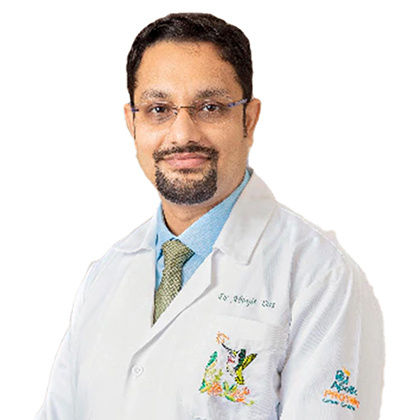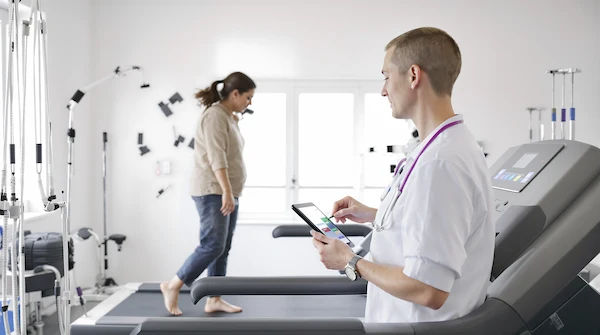Ankle-Brachial Index Test for PAD Diagnosis
Learn about the Ankle-Brachial Index (ABI) test, a simple and non-invasive method used to diagnose Peripheral Artery Disease (PAD). Discover how the test works, what to expect, and why early detection is important.

Written by Dr. Dhankecha Mayank Dineshbhai
Reviewed by Dr. Rohinipriyanka Pondugula MBBS
Last updated on 2nd Sep, 2025

Introduction
If you or someone you know has been experiencing leg pain, numbness, or cramping while walking, it could be a sign of Peripheral Artery Disease (PAD). PAD occurs when narrowed arteries reduce blood flow to the limbs, often causing discomfort and increasing the risk of serious complications.
One of the simplest and most effective ways to diagnose PAD is through the Ankle-Brachial Index (ABI) test. This non-invasive, painless test compares the blood pressure in your ankles with that in your arms to check for circulation problems.
In this article, we’ll explain what the ABI test is and how it works, why it’s important for diagnosing PAD, what to expect during the test, how to interpret the results and lifestyle changes to improve circulation.
What is the Ankle-Brachial Index (ABI) Test?
The ABI test is a quick and simple way to check for poor blood flow in the legs. It measures the ratio of blood pressure in your ankle to the blood pressure in your arm.
- Normal blood flow: ABI between 1.0 and 1.4
- Possible PAD: ABI below 0.9
- Severe PAD: ABI below 0.4
Since PAD can lead to serious complications like heart disease, stroke, or even limb amputation if untreated, early detection through this test is crucial.
Consult a Vascular Surgeon for the best advice
Why is the ABI Test Important for PAD Diagnosis?
PAD often goes undiagnosed because its symptoms (like leg pain while walking) are mistaken for normal ageing or arthritis. However, untreated PAD increases the risk of:
- Heart attack or stroke (due to blocked arteries)
- Non-healing wounds or infections (poor circulation slows healing)
- Critical limb ischemia (severe blockage leading to tissue death)
The ABI test helps detect PAD early, allowing for timely treatment to prevent complications.
Who Should Get an ABI Test?
You may need an ABI test if you have:
- Leg pain, cramping, or fatigue while walking (claudication)
- Numbness or weakness in the legs
- Slow-healing wounds on feet or legs
- Risk factors like diabetes, smoking, high blood pressure, or high cholesterol
Even without symptoms, people over 50 with diabetes or smoking history should consider screening.
What to Expect During the ABI Test?
The test is painless, non-invasive, and takes about 15 minutes. Here’s what happens:
1. You lie down comfortably while a healthcare provider places blood pressure cuffs on your arms and ankles.
2. A Doppler ultrasound device measures blood flow in your limbs.
3. Blood pressure readings are taken from both arms and ankles.
4. The ABI ratio is calculated by dividing the ankle pressure by the arm pressure.
No needles or special preparation is needed; just wear loose clothing for easy access to arms and legs.
Understanding Your ABI Results
Interpreting your Ankle-Brachial Index (ABI) results is key to understanding your vascular health.
If your ABI is low, your doctor may recommend further tests like:
- Doppler ultrasound (to visualize blood flow)
- Angiography (to locate blockages)
- CT or MRI scans (for detailed images)
How to Manage PAD and Improve Circulation
If diagnosed with PAD, lifestyle changes and medical treatment can help:
1. Exercise Regularly
- Walking (even with pain) improves circulation.
- Supervised exercise programs are highly effective.
2. Quit Smoking
- Smoking worsens artery damage; seek help to quit.
3. Eat a Heart-Healthy Diet
- Focus on fruits, vegetables, whole grains, and lean proteins.
- Reduce salt, sugar, and saturated fats.
4. Control Blood Pressure & Cholesterol
- Take prescribed medications if needed.
- Monitor levels regularly.
5. Foot Care for Diabetes
- Check feet daily for wounds.
- Wear comfortable shoes to prevent injuries.
When to See a Doctor?
If you experience:
- Persistent leg pain while walking
- Cold or discolored feet
- Sores that won’t heal
Consult a vascular specialist immediately. Early treatment can prevent complications.
Final Thoughts
The Ankle-Brachial Index test is a simple, painless, and effective way to detect PAD early. If you have risk factors or symptoms, don’t ignore them; early diagnosis can save your limbs and heart.
Consult a Vascular Surgeon for the best advice
Consult a Vascular Surgeon for the best advice

Dr Prakash Goura
Vascular and Endovascular Surgeon
8 Years • MBBS , DNB ( GENERAL SURGERY) , DNB ( GENERAL SURGERY) , MCh( VASCULAR & ENDOVASCULAR SURGERY)
Nanded
Apollo Hospitals Information Centre,Dr Rajendra Patil, Physiotheraphy Centr, Nanded

Dr. Prakash Goura
Vascular and Endovascular Surgeon
8 Years • MBBS , DNB ( GENERAL SURGERY) , DNB ( GENERAL SURGERY) , MCh( VASCULAR & ENDOVASCULAR SURGERY)
Karimnagar
Apollo Reach Hospitals- Karimnagar, Karimnagar

Dr. Harsha Goutham H V
Cardiologist
20 Years • MBBS, MS, MCH
Bengaluru
Apollo Clinic, Electronic City, Bengaluru
(25+ Patients)

Dr. R. Jayakrishnan
Vascular Surgeon
20 Years • MBBS, MS, MRCS, MCH
Chennai
Apollo Medical Centre, Annanagar, Chennai

Dr. Abhijit Das
Surgical Oncologist
10 Years • MBBS MS, MCh (Surgical Oncology), Fellowship in Thoracic Oncology (SNUK, Korea), Fellowship in Advance Esophageal Surgery (NCC, Japan)
Chennai
Apollo Proton Cancer Center, Chennai
Consult a Vascular Surgeon for the best advice

Dr Prakash Goura
Vascular and Endovascular Surgeon
8 Years • MBBS , DNB ( GENERAL SURGERY) , DNB ( GENERAL SURGERY) , MCh( VASCULAR & ENDOVASCULAR SURGERY)
Nanded
Apollo Hospitals Information Centre,Dr Rajendra Patil, Physiotheraphy Centr, Nanded

Dr. Prakash Goura
Vascular and Endovascular Surgeon
8 Years • MBBS , DNB ( GENERAL SURGERY) , DNB ( GENERAL SURGERY) , MCh( VASCULAR & ENDOVASCULAR SURGERY)
Karimnagar
Apollo Reach Hospitals- Karimnagar, Karimnagar

Dr. Harsha Goutham H V
Cardiologist
20 Years • MBBS, MS, MCH
Bengaluru
Apollo Clinic, Electronic City, Bengaluru
(25+ Patients)

Dr. R. Jayakrishnan
Vascular Surgeon
20 Years • MBBS, MS, MRCS, MCH
Chennai
Apollo Medical Centre, Annanagar, Chennai

Dr. Abhijit Das
Surgical Oncologist
10 Years • MBBS MS, MCh (Surgical Oncology), Fellowship in Thoracic Oncology (SNUK, Korea), Fellowship in Advance Esophageal Surgery (NCC, Japan)
Chennai
Apollo Proton Cancer Center, Chennai


_4.webp)

